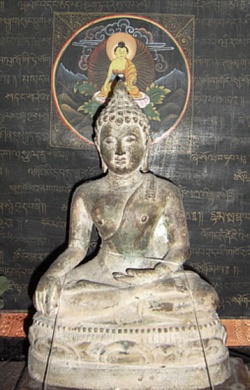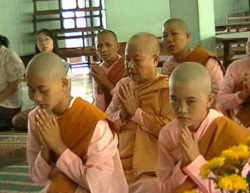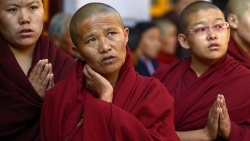The purity of no-self
Are we fundamentally sinful beings?
Or fundamentally pure?
Or somewhere in between those two extremes? Even within the body of Buddhist teachings there is a variety of ways of looking at human nature.
Buddhist scholar and practitioner Justin Whitaker tries to bring some clarity to the murky area of purity.
The notion of purification can be a puzzling one for the modern Dharma practitioner.
Am I impure? Is there something, somewhere deep inside me, that is bad or wrong and must be gotten rid of?
Such questions ruffle my brow, yet it turns out that they point to one of Buddhism’s fundamental teachings.
Like many Westerners practicing the Dharma today, I was born into a Christian society and attended church for much of my youth.
Also, like many others, I felt uncomfortable with teachings of sin and guilt and rejected this aspect of my upbringing.
In turn I looked to humanism and eventually Buddhism for what I took to be a more open and optimistic outlook. So when the Buddhist notion of purification is raised, I tend to put on my skeptic’s hat.
What does Buddhism have to say about purification? On the one hand is the anecdotal but telling story from a friend of mine who lives in Malta.
The island was recently visited by a reputable Tibetan Lama giving teachings on Powa (‘pho ba, the [[Tibetan teaching on conscious dying).
As the story goes, , during a question-and-answer period, one of the students asked the Lama, “is the goal of Buddhism that we purify ourselves, to become pure beings?”
The Lama immediately and vehemently replied, “Nothing to purify! Already perfect pure!”
…one often hears that we are enlightened already; all we need to do is realize it!
Throughout Mahayana Buddhism, which encompasses Tibetan, Ch’an, Zen, Korean, Vietnamese, and influences most Western forms of Buddhism, there is this teaching of fundamental purity.
Deep within us is an undefiled purity – as the Lama said, ultimately we are, “perfect pure!”
The Sanskrit term for this deep purity is the Tathagatagarbha, the “womb of enlightenment.”
Based primarily on this doctrine, one often hears that we are enlightened already; all we need to do is realize it!
On the other hand there are many teachings in Buddhism that suggest that the spiritual life is a path.
This path leads away from our current greed, hatred, and delusion (a.k.a. samsara), and guides us towards calm, equanimity, joy, and swift responsiveness to the needs and sufferings of all beings (nibbana, nirvana).
Foremost amongst these teachings is the Visuddhimagga, the Path of Purification.
This massive tome, written in the 5th century by the Theravadin monk Buddhaghosa, describes the path of virtue or morality, concentration, and wisdom.
It suggests that these steps are sequential, first one perfects morality, then concentration, and finally wisdom.
From this teaching we may surmise that there really are things within us that need purification.
We are, as beginners, defiled by our wrong views, our lack of mindfulness, and our immoral deeds. So in a sense we are impure.
There seem to be two different teachings here: one saying that we are pure and just need to wake up to that, and the other saying that we are impure and need to follow the path laid forth by the Buddha to attain purity or our own awakening.
Which is right?
The absence of self is not merely an absence, but a connectedness, a fullness beyond description.
Without going into too much metaphysical detail, I think we can see that both are correct.
Deep down, all of Buddhism affirms our purity because all of Buddhism affirms the teaching of no-self.
Sin is not at our core, but neither is some sort of pure being, or any thing that we just need to uncover.
At the core is no-core. Very Zen, right?
Yet no-self is not a teaching of nihilistic self-denial or an abrogation of our responsibilities.
One influential Mahayana text, the Avatamsaka (Flower Garland Sutra, provides us with a useful image for understanding this, that of a celestial jeweled net.
When we look closely into any jewel in the net, what we find is every other jewel reflected; likewise the more deeply we look within, the more deeply we see our fundamental interconnectedness with everything.
The absence of self is not merely an absence, but a connectedness, a fullness beyond description.
But around the core which connects us to all beings is “us,” with all of our bad habits, mistaken ideas, and (most nefarious of all in Buddhism) our very concept of self.
Asmi-mana is the Pali phrase, the “conceit I-am.” It refers not to the everyday usage of the words “I am.”
The Buddha himself used these. It refers instead to the very deep psychological clinging to a separate identity, like trying to look at a jewel in that net without seeing the others.
But that is the way we start out in this world and on the Buddhist path, feeling quite separate, as if our jewel were somehow so far away from the rest.
The First and Second Noble Truths of Buddhism affirm the craving and suffering that follow from this feeling of separation.
The Third and Fourth Noble Truths, the “good news” of Buddhism, tell us that suffering can be overcome and provide a path for us to follow.
Undertaking the practices of the path allows us to live the wisdom of no-self, to bring this realization into the flesh.
Having the understanding of our already enlightened nature can serve as a great comfort and inspiration to begin and stay on the path.
But it cannot substitute the steps of moral development, mindful cultivation, and learned inquiry that we find throughout the history of Buddhism in every school and sect.
So, according to Buddhism, we are pure. Impurity is an illusion, so too is the illusion of our separateness – in fact the two are intertwined.
Waking up to our interconnectedness, looking within and seeing only infinite reflected jewels; this is goal of the Buddhist path.
Yet how often can one simply do this? More often, when we look within we see only a tangled mass of thoughts, images, memories, hopes, and desires obscuring our pure nature. So we embark on the path, our journey through the tangled mass to the purity of no-self.
Justin Whitaker holds a Masters degree in Buddhist Studies from Bristol University, England and is currently a Ph.D. student in Buddhist Ethics at the University of London.
He has practiced in several Buddhist traditions and is currently practicing with the Western Buddhist Order through the internet with his friend and teacher, Achintya, in Bristol, UK.
He lives near Washington DC with his fiancée and (not so) secretly longs to return to his home state of Montana.
His personal blog is americanbuddhist.blogspot.com.
Source
http://www.wildmind.org/blogs/on-practice/the-purity-of-no-self



